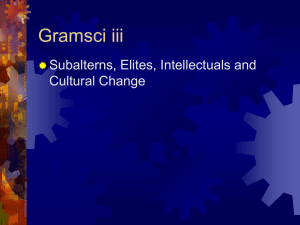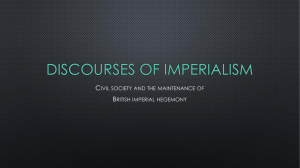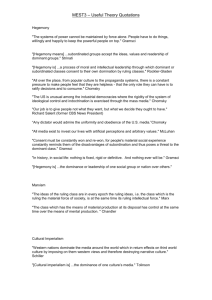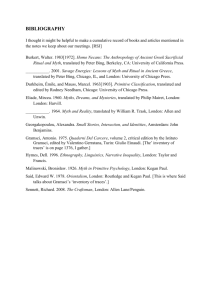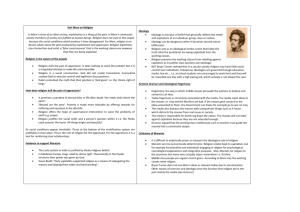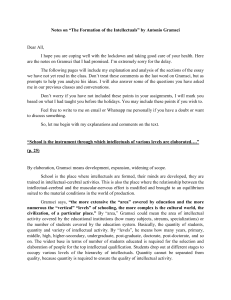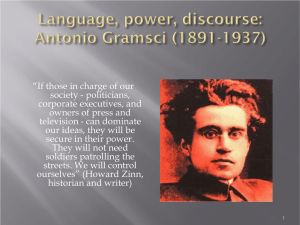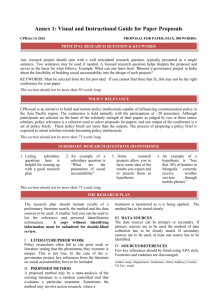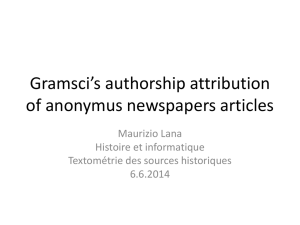The Precepts of Hegemony and Counter
advertisement
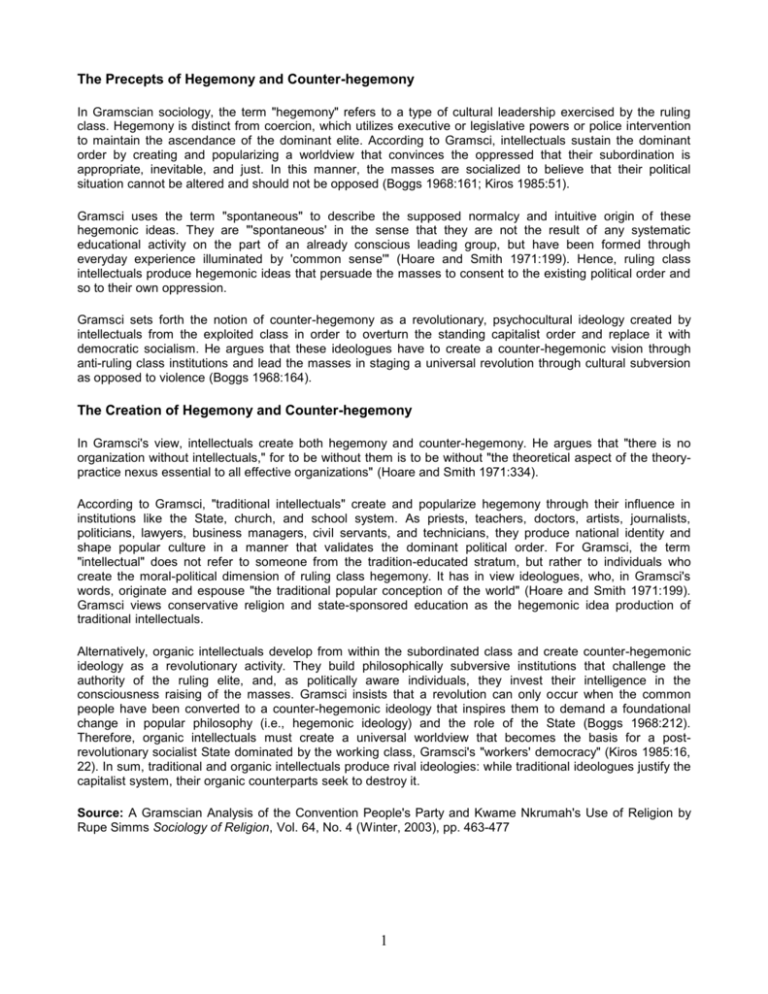
The Precepts of Hegemony and Counter-hegemony In Gramscian sociology, the term "hegemony" refers to a type of cultural leadership exercised by the ruling class. Hegemony is distinct from coercion, which utilizes executive or legislative powers or police intervention to maintain the ascendance of the dominant elite. According to Gramsci, intellectuals sustain the dominant order by creating and popularizing a worldview that convinces the oppressed that their subordination is appropriate, inevitable, and just. In this manner, the masses are socialized to believe that their political situation cannot be altered and should not be opposed (Boggs 1968:161; Kiros 1985:51). Gramsci uses the term "spontaneous" to describe the supposed normalcy and intuitive origin of these hegemonic ideas. They are "'spontaneous' in the sense that they are not the result of any systematic educational activity on the part of an already conscious leading group, but have been formed through everyday experience illuminated by 'common sense'" (Hoare and Smith 1971:199). Hence, ruling class intellectuals produce hegemonic ideas that persuade the masses to consent to the existing political order and so to their own oppression. Gramsci sets forth the notion of counter-hegemony as a revolutionary, psychocultural ideology created by intellectuals from the exploited class in order to overturn the standing capitalist order and replace it with democratic socialism. He argues that these ideologues have to create a counter-hegemonic vision through anti-ruling class institutions and lead the masses in staging a universal revolution through cultural subversion as opposed to violence (Boggs 1968:164). The Creation of Hegemony and Counter-hegemony In Gramsci's view, intellectuals create both hegemony and counter-hegemony. He argues that "there is no organization without intellectuals," for to be without them is to be without "the theoretical aspect of the theorypractice nexus essential to all effective organizations" (Hoare and Smith 1971:334). According to Gramsci, "traditional intellectuals" create and popularize hegemony through their influence in institutions like the State, church, and school system. As priests, teachers, doctors, artists, journalists, politicians, lawyers, business managers, civil servants, and technicians, they produce national identity and shape popular culture in a manner that validates the dominant political order. For Gramsci, the term "intellectual" does not refer to someone from the tradition-educated stratum, but rather to individuals who create the moral-political dimension of ruling class hegemony. It has in view ideologues, who, in Gramsci's words, originate and espouse "the traditional popular conception of the world" (Hoare and Smith 1971:199). Gramsci views conservative religion and state-sponsored education as the hegemonic idea production of traditional intellectuals. Alternatively, organic intellectuals develop from within the subordinated class and create counter-hegemonic ideology as a revolutionary activity. They build philosophically subversive institutions that challenge the authority of the ruling elite, and, as politically aware individuals, they invest their intelligence in the consciousness raising of the masses. Gramsci insists that a revolution can only occur when the common people have been converted to a counter-hegemonic ideology that inspires them to demand a foundational change in popular philosophy (i.e., hegemonic ideology) and the role of the State (Boggs 1968:212). Therefore, organic intellectuals must create a universal worldview that becomes the basis for a postrevolutionary socialist State dominated by the working class, Gramsci's "workers' democracy" (Kiros 1985:16, 22). In sum, traditional and organic intellectuals produce rival ideologies: while traditional ideologues justify the capitalist system, their organic counterparts seek to destroy it. Source: A Gramscian Analysis of the Convention People's Party and Kwame Nkrumah's Use of Religion by Rupe Simms Sociology of Religion, Vol. 64, No. 4 (Winter, 2003), pp. 463-477 1


